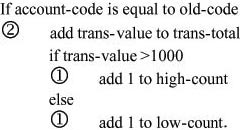| |
| |
 |
|
| |
COBOL TUTORIAL
FOR BCA STUDENTS OF M G UNIVERSITY |
|
| |
|
|
| |
 |
|
| |
|
| |
|
|
| |
|
|
| |
|
| |
The
then and else statement of an IF statement can contain
other IF statements. The included IF statements in
their turn may also contain other IF statements. Such
inclusion of one or more IF statements within the
scope of an IF statement is called nesting.
Note that the most inclusive IF statement must have
a terminating period and thus this statement along
with all the included statements is often called or
NESTED IF STATEMENT.
Since the else phrase in an IF statement is optional,
a nested If sentence may have fewer ELSEs than Ifs.
The nested IF sentence should be examined in a left-
to-right manner to encounter each ELSE in the order
of its appearance. As soon as an ELSE is encountered,
it must be paired with the immediately preceding IF
that has not yet been paired with another ELSE.
Example:
|
|
| |
 |
|
| |
This nested IF sentence contains two IFs and one ELSE.
The IF-ELSE pair has been marked by the number 1 within
a circle. The IF marked with 2 within a circle is
an IF without any ELSE.
Example:
|
|
| |
|
|
| |
The use of NEXT SENTENCE either in the then or else
parts of an IF statement is recommended. The only
exception can be when the ELSE NEXT SENTENCE phrase
is immediately followed by the terminating period
of the IF sentence, this is because the control will
be transferred to the next sentence regardless of
whether or not the ELSE NEXT SENTENCE phrase is explicitly
included.
|
|
| |
 |
|
| |
|
|
| |
 |
|
| |
|
|
|
|
